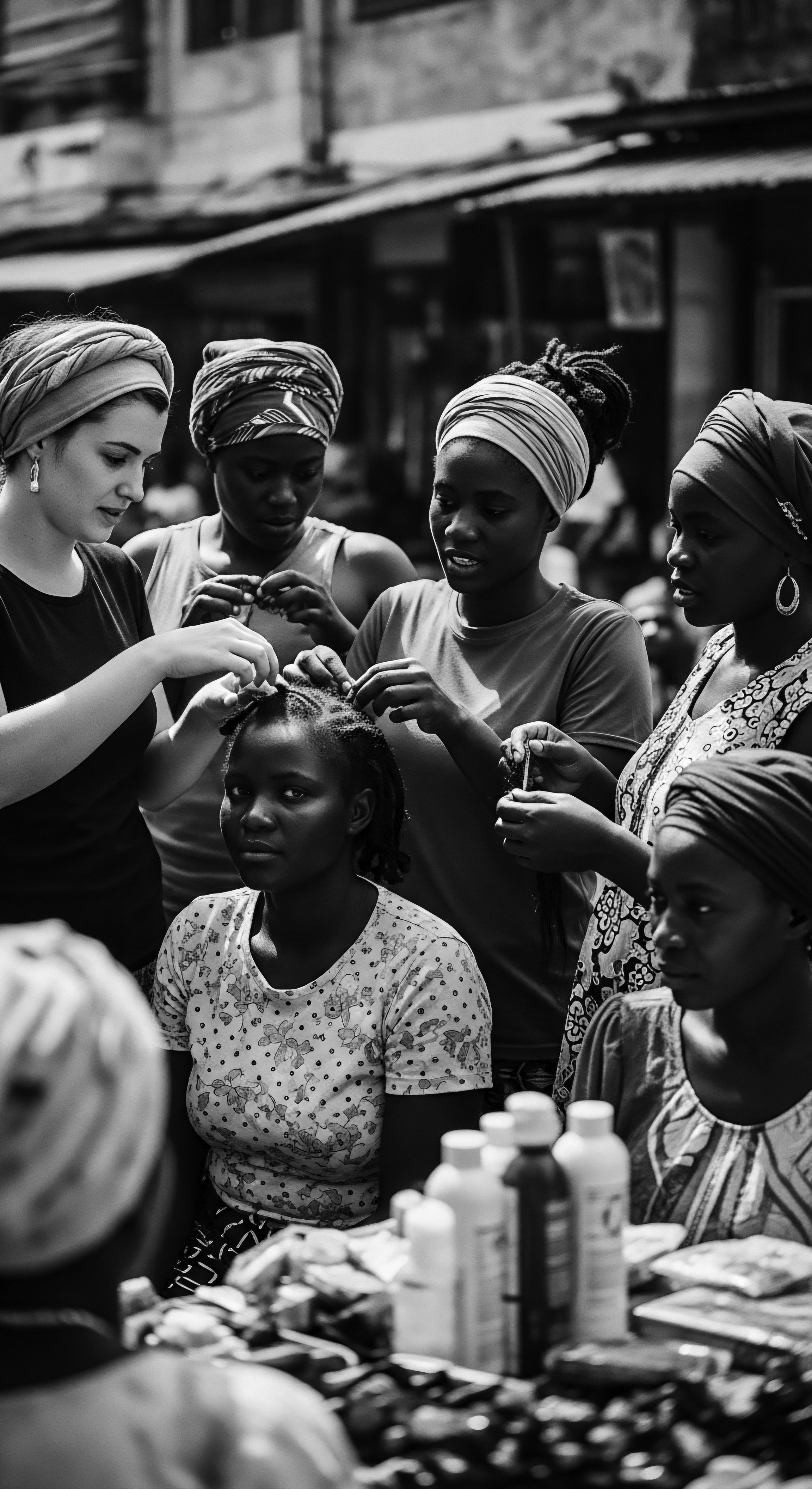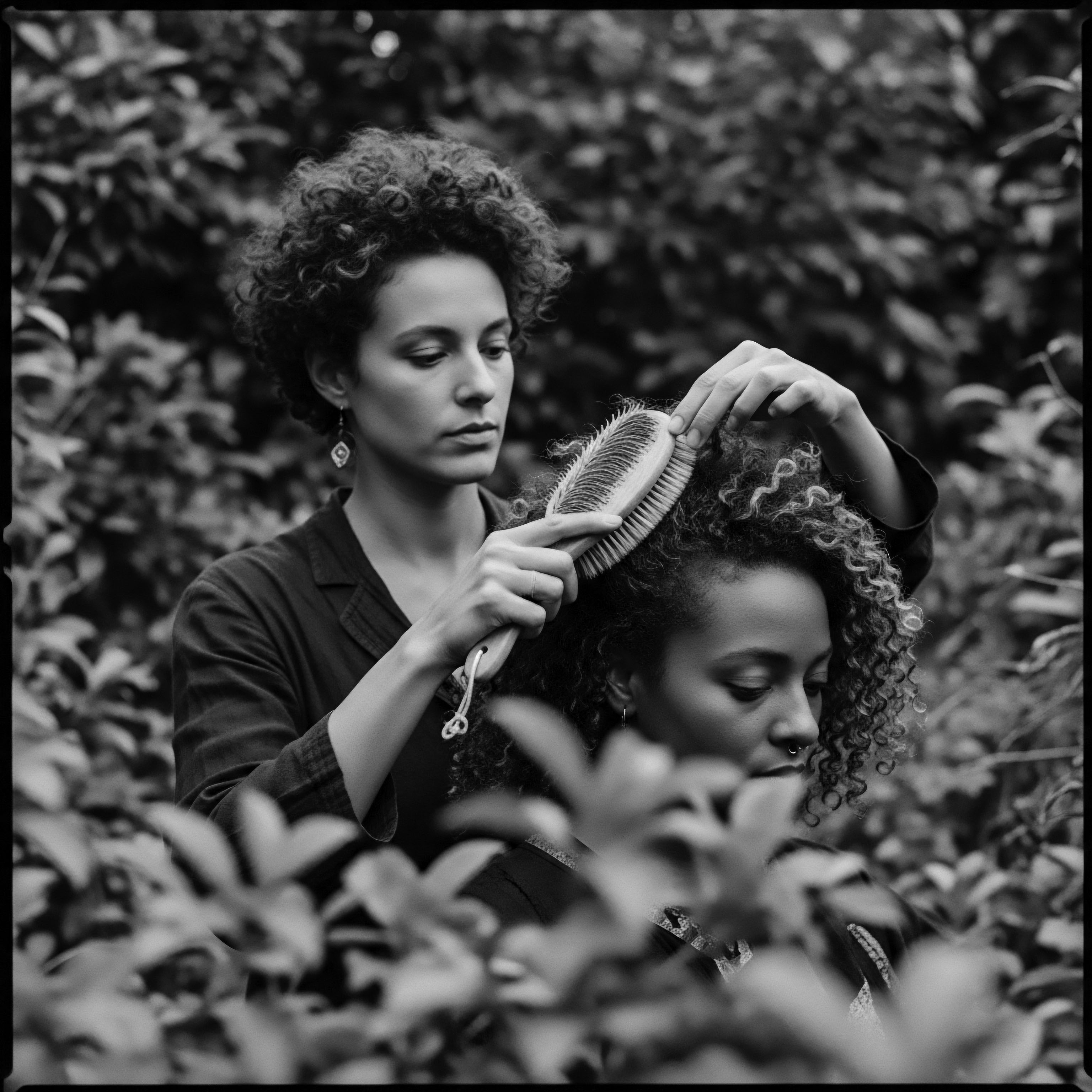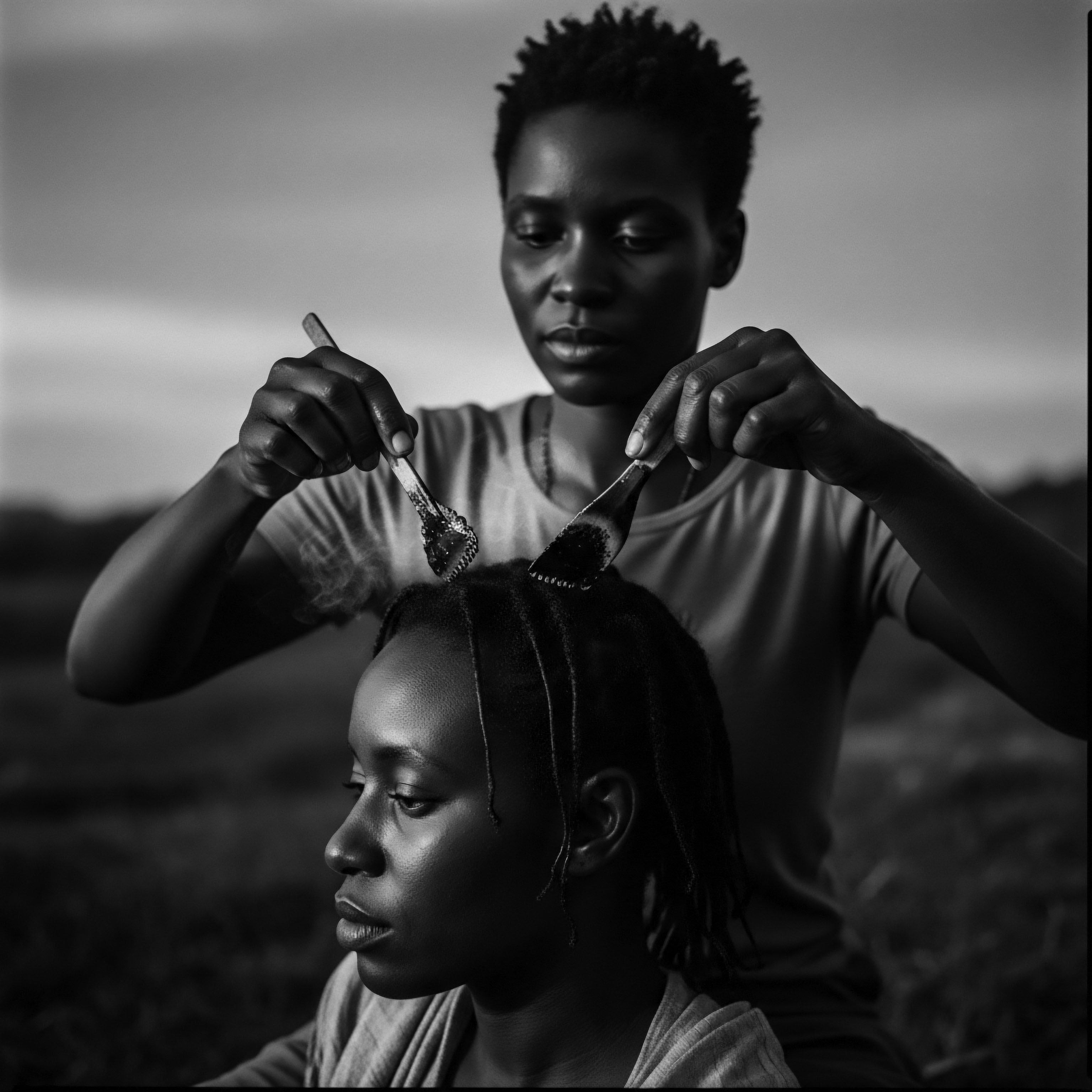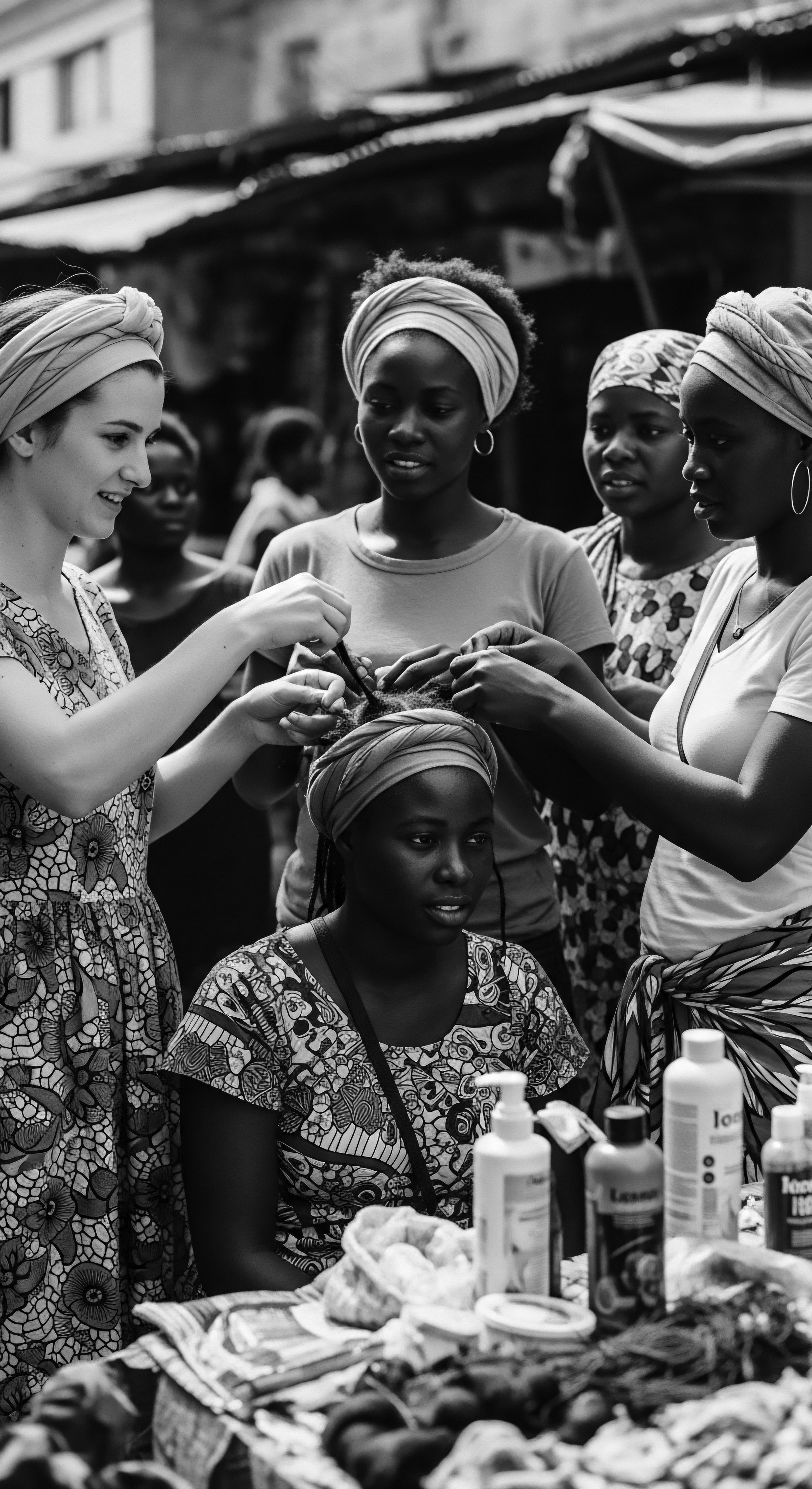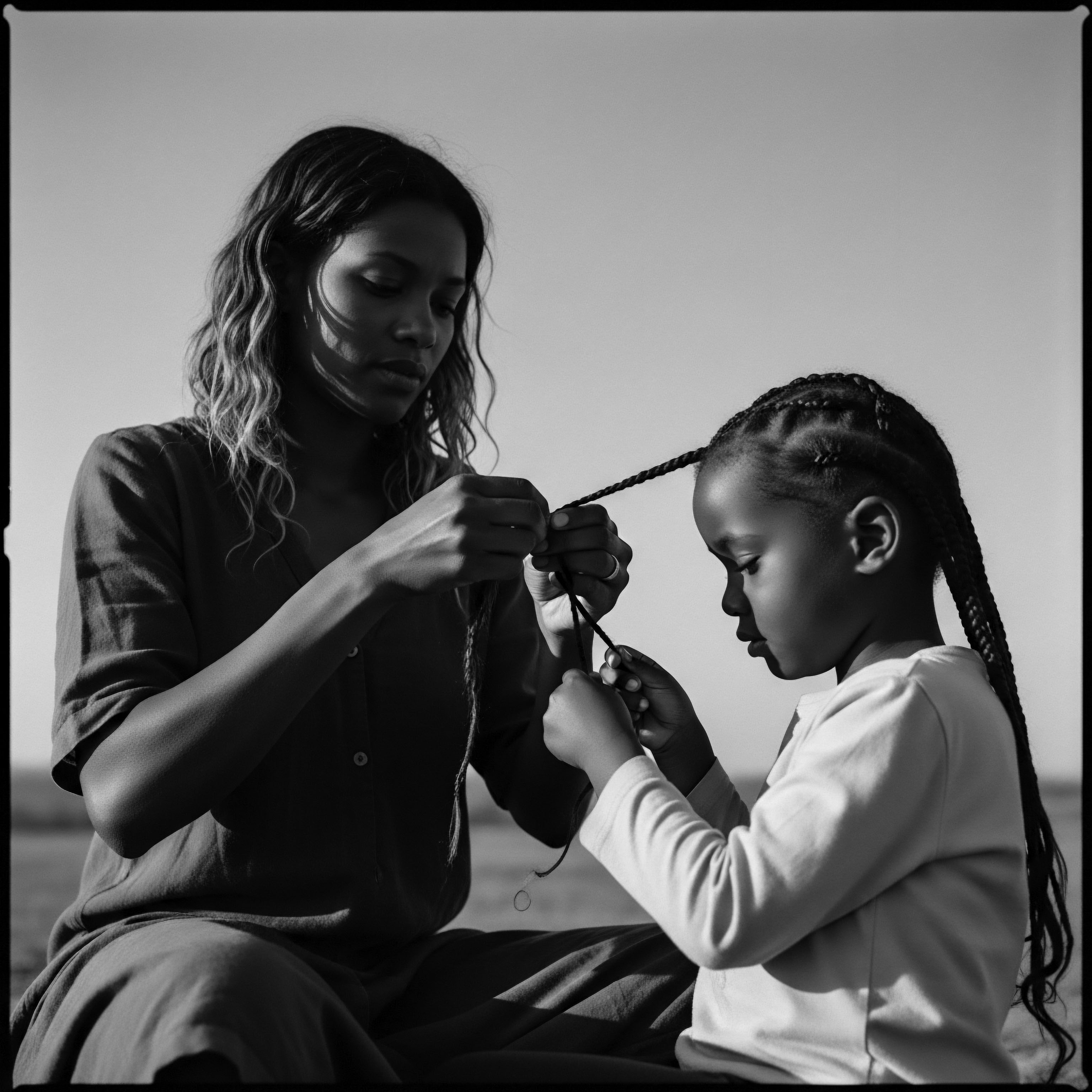
Fundamentals
The concept of Female Entrepreneurs, when viewed through the unique lens of textured hair heritage, begins with a foundational understanding of women creating economic pathways centered on hair care and adornment. This initial contemplation takes us back to the earliest known practices of hair styling, not as a mere vanity, but as a deep-seated cultural expression and a practical necessity. In its simplest interpretation, Female Entrepreneurs in this context refers to any woman who has transformed her knowledge of hair, particularly coily, kinky, and wavy textures, into a means of sustenance or communal benefit. This encompasses the skilled artisan who braided intricate patterns, the wisdom keeper who concocted nourishing plant-based elixirs, or the market woman who traded ancestral hair tools.
These early forms of female entrepreneurship were often informal, yet they possessed a robust structure grounded in intergenerational knowledge transfer and community reciprocity. The very act of styling or caring for textured hair was a communal affair, often taking place in shared spaces, under the shade of a tree, or within the privacy of familial compounds. Here, older women imparted their understanding of specific botanical remedies for scalp health, demonstrated deft finger techniques for detangling, and shared methods for preserving styles.
These informal academies served as fertile ground for nurturing what would later become formal businesses. The inherent value placed on well-maintained hair within many ancestral African societies meant that those who possessed specialized skills were highly regarded, fostering an environment where their talents could be recognized and compensated, even if not in conventional monetary terms.

Early Expressions of Hair-Based Enterprise
Before the formal establishment of salons or product lines, women across African diasporic communities developed diverse systems of exchange around hair. The preparation of hair treatments, the crafting of adornments, and the provision of styling services were often part of a broader network of skilled labor. This network supported not just individual needs, but also reinforced collective identity and social cohesion. Women might trade hair services for other goods, assist one another in braiding sessions, or specialize in the creation of unique headwraps that signaled status or origin.
- Skill Transfer ❉ Elders passed down intricate braiding techniques, showing how to achieve particular patterns and what they symbolized.
- Resourcefulness ❉ Women utilized local botanicals, oils, and clays to create hair masks, conditioners, and cleansers, drawing from inherited wisdom about plant properties.
- Community Support ❉ Hair care became a reciprocal act, a shared experience that strengthened bonds and provided informal economic opportunities within communities.
The core of this early enterprise lay in the belief that hair was not merely an aesthetic feature. It carried spiritual significance, reflected social standing, and served as a chronicle of personal and communal journeys. Consequently, the women who maintained and styled hair were seen as caretakers of this profound heritage, their services commanding respect and, often, a means of livelihood. This early economic activity, though far removed from modern corporate structures, provides a fundamental illustration of female entrepreneurship born from a sacred understanding of hair and its place in identity.

Intermediate
Moving beyond the elemental expressions, an intermediate interpretation of Female Entrepreneurs within the textured hair sphere recognizes the transition from informal communal exchanges to more structured, albeit often still community-centric, business models. This evolution occurred as external pressures and evolving societal landscapes prompted women to formalize their inherited hair care practices. The growth of urban centers, the impact of colonialism, and the enduring legacy of systemic oppression often presented both formidable challenges and unexpected avenues for entrepreneurial women to adapt and innovate their hair-based ventures.
In the wake of forced migrations and the complex formations of diasporic communities, the continuity of traditional hair practices became a powerful act of resistance and cultural affirmation. Women, often barred from mainstream economic avenues, channeled their ingenuity into establishing independent livelihoods. These undertakings, though perhaps modest in scale, were deeply significant.
They provided not only a source of income for families but also created safe spaces where shared heritage could be celebrated and preserved. The beauty shop, in its nascent forms, emerged as a sanctuary, a place where Black and mixed-race women could find respite, share stories, and receive care that honored their unique hair textures, often dismissed or denigrated by dominant beauty standards.
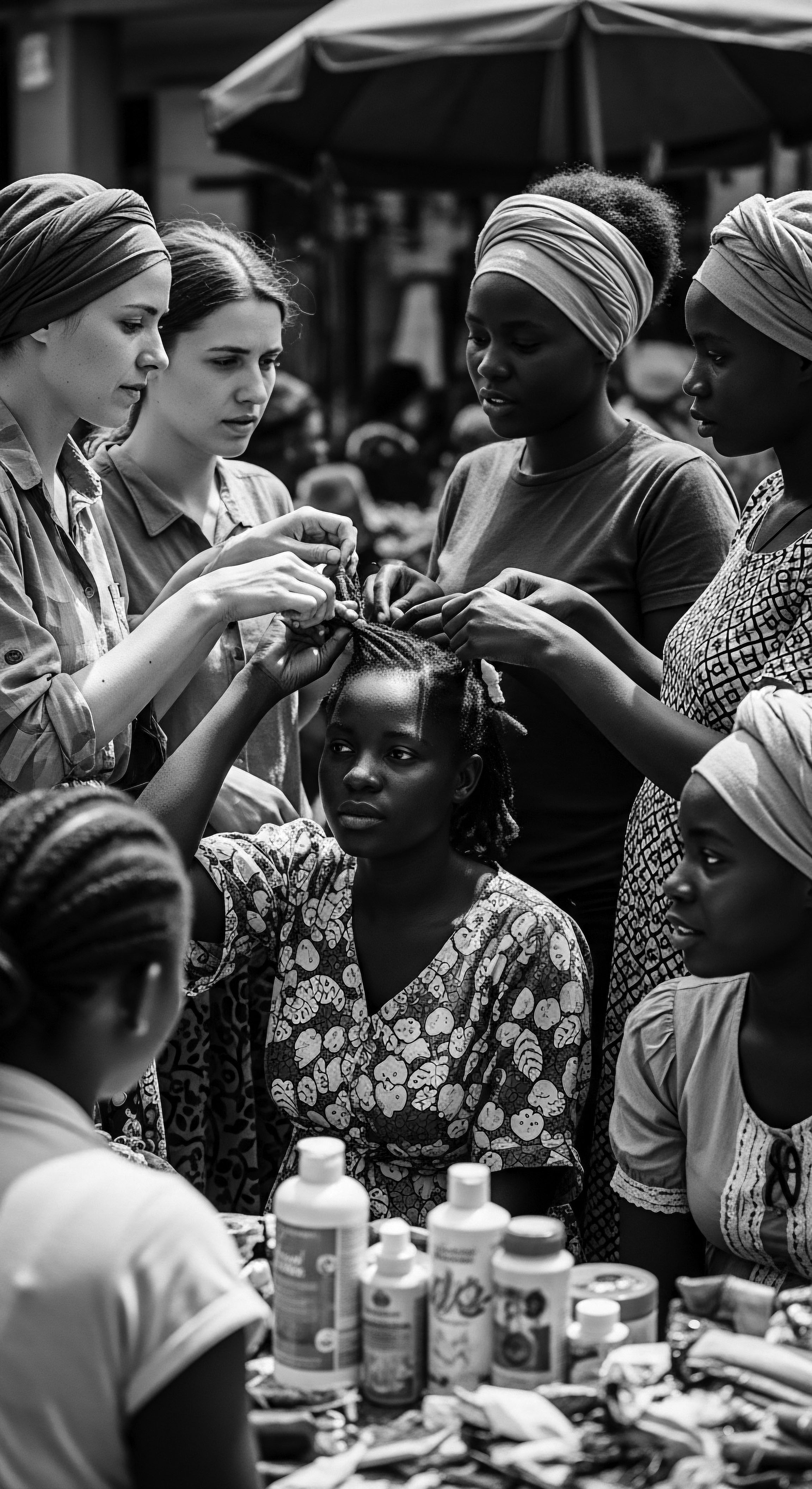
Emergence of Defined Spaces and Systems
The mid-19th and early 20th centuries witnessed the gradual formalization of hair care services. This period saw the rise of ‘kitchen beauticians’ ❉ a term, while seemingly unassuming, that holds deep historical and entrepreneurial weight. These women operated out of their homes, transforming domestic spaces into bustling hubs of hair artistry and community gathering. They leveraged their intimate knowledge of hair to create products, apply complex styles, and offer consultations that catered specifically to the needs of textured hair, a market largely ignored or poorly served by mainstream industries.
The journey of Female Entrepreneurs in textured hair care reveals a persistent spirit of transforming ancestral wisdom into economic self-determination.
The skills they offered, passed down through generations, became commodities of immense value. These entrepreneurs provided more than just styling; they offered affirmation, a sense of belonging, and a mirror that reflected the inherent beauty of diverse hair patterns back to those who seldom saw themselves celebrated. Their enterprises were often characterized by a strong sense of ethical responsibility, a commitment to quality that stemmed from a deep understanding of hair health, and a nurturing approach that echoed ancient practices of care. They understood the biological nuances of coily strands and the emotional weight carried by each curl and kink.
This phase also saw the rudimentary beginnings of product development. Women would mix and blend natural ingredients, drawing upon traditional knowledge of plant-based remedies and oils to create pomades, cleansers, and conditioners. These early formulations, often made in small batches for immediate community use, represented a direct link between ancestral wisdom and emerging commercial endeavor. The success of these informal ventures laid the groundwork for larger, more organized businesses, demonstrating a powerful economic force that arose from cultural necessity and an enduring connection to hair heritage.
The impact of these Female Entrepreneurs extended beyond mere economics; they fostered cultural resilience. In an era when textured hair was often deemed “unprofessional” or “unruly,” these women provided services and products that allowed individuals to wear their hair with dignity and pride. This intermediate stage of female entrepreneurship signifies the deepening of understanding, where the act of commerce became inextricably linked with the preservation of cultural identity and the provision of essential, culturally sensitive care.
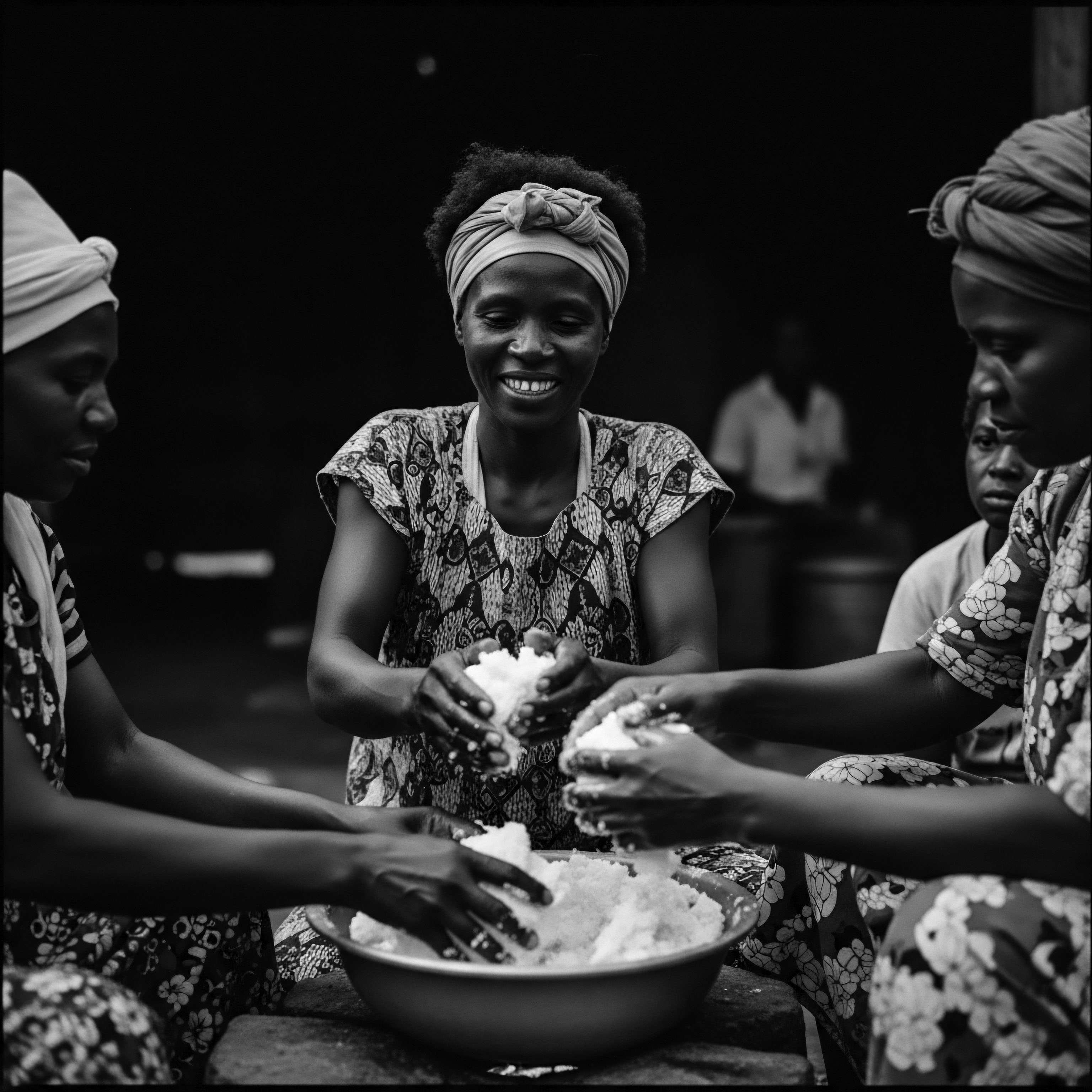
Academic
The academic understanding of Female Entrepreneurs, particularly within the textured hair heritage landscape, transcends a simplistic definition of business ownership. It represents a complex interplay of historical agency, cultural preservation, and socio-economic resistance against prevailing hegemonies. To articulate this concept fully, we must consider it a specific form of entrepreneurial endeavor rooted in the unique challenges and opportunities faced by women of African descent in navigating a world that often sought to diminish their intrinsic beauty and economic autonomy. This form of entrepreneurship finds its most profound expression in the transformation of ancestral hair practices into formalized, community-sustaining ventures.
Historically, Black women, often excluded from formal economic sectors due to racial and gender discrimination, channeled their ingenuity into cultivating enterprises that addressed the unmet needs of their communities. The hair care industry, in particular, became a fertile ground for such endeavors. It was a sphere where inherent knowledge, passed through generations, could be monetized, creating pathways to self-sufficiency and communal uplift. This is not merely about product creation or service provision; it concerns the reassertion of cultural value and the construction of economic spaces where Black identity, specifically through hair, could be affirmed and celebrated.
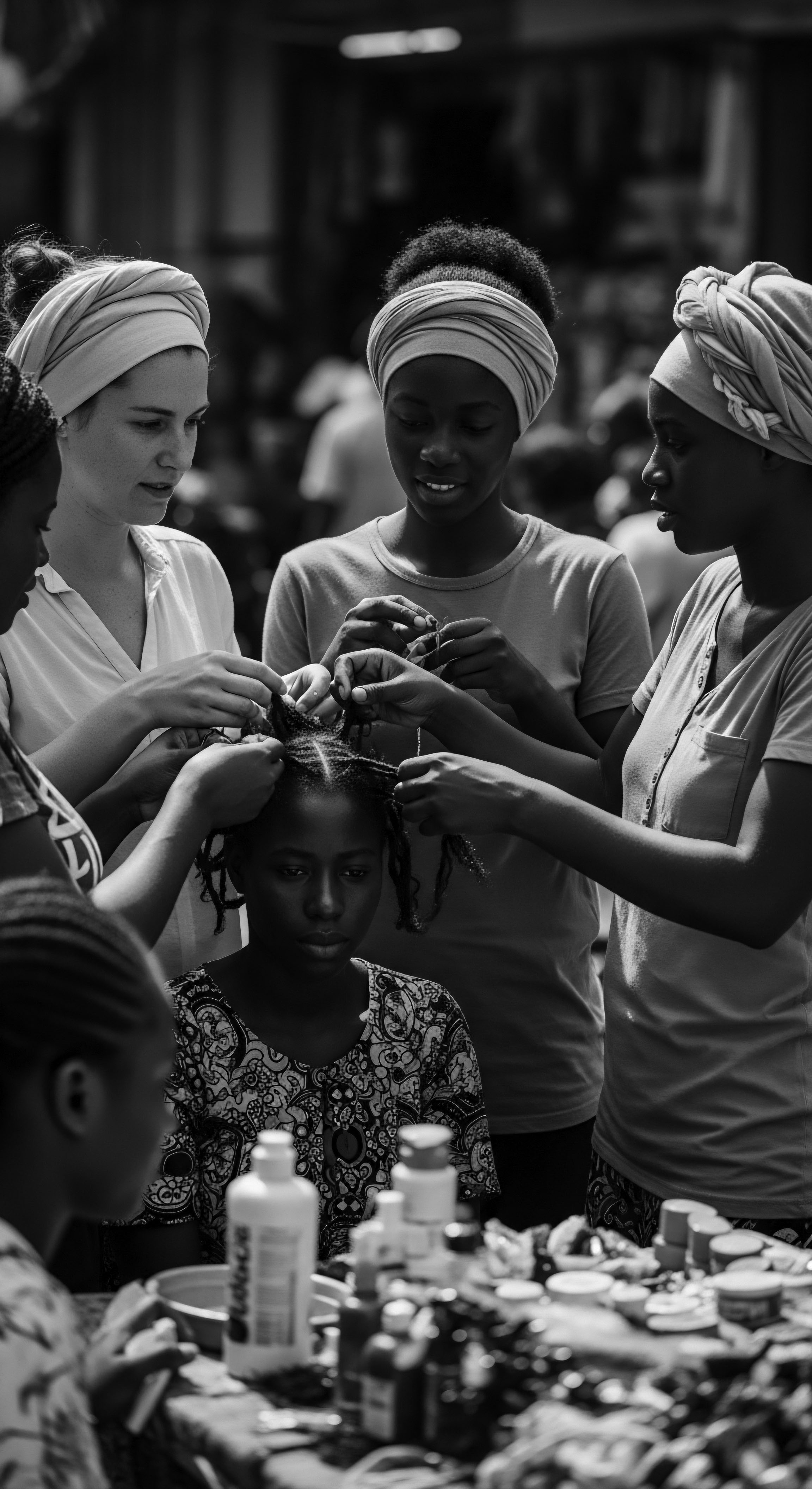
The Architecture of Ancestral Economic Spaces
The meaning of Female Entrepreneurs, in this academic context, is intrinsically tied to the concept of the racial enclave economy and the critical role of women in establishing its foundational elements. These women, often operating with minimal capital and facing significant societal barriers, created vibrant networks that sustained families and communities. Their businesses were rarely isolated entities; they were interconnected nodes within a larger system of mutual support and cultural exchange.
Female Entrepreneurs in textured hair care represent a powerful legacy of converting marginalized knowledge into economic power and cultural affirmation.
Consider the widespread phenomenon of the “kitchen beautician” in the late 19th and early 20th centuries across the United States. These informal practitioners, working from their homes, were not merely offering a service; they were actively preserving and adapting ancestral hair care practices in a new environment. They transformed personal dwellings into sites of commerce and community, where knowledge of traditional ingredients, intricate styling techniques, and therapeutic touch was meticulously applied. This phenomenon stands as a powerful, yet often undervalued, example of this specialized entrepreneurial spirit.
Tiffany M. Gill, in her seminal work, Beauty Shop Politics: African American Women’s Activism in the Beauty Industry (2010), examines how these seemingly domestic spaces functioned as crucial economic and political platforms. Gill illustrates how these women, through their economic independence and access to a public community space, parlayed their positions into powerful platforms for activism and social change. These beauty enterprises were not merely about profit; they were about creating spaces where Black women could literally “let their hair down” and discuss issues, organize, and build collective power, defying the limitations imposed by Jim Crow segregation. This underscores how the economic agency of these Female Entrepreneurs was inseparable from their role in community building and political mobilization.

Community Catalysts and Knowledge Keepers
The impact of these Female Entrepreneurs extended well beyond economic metrics. They functioned as vital repositories of ancestral hair wisdom, adapting traditional remedies and techniques for a new context. For example, knowledge of natural oils, herbs, and heating methods, passed down from previous generations, was applied to address the specific needs of textured hair, often contrasted with the damaging practices promoted by mainstream beauty culture.
The collective entrepreneurial efforts of these women, often unrecorded in formal economic histories, reveal a significant unquantified economic impact within their communities. Their informal beauty networks were the lifeblood of many Black neighborhoods, providing employment, education, and essential services when few other avenues existed.
The very definition of Female Entrepreneurs in this realm must therefore encompass the nuanced understanding of their dual role: that of economic provider and cultural guardian. They were innovators in product development, stylists who shaped identity through hair, and community organizers who leveraged their intimate client relationships for broader social good. This holistic view acknowledges the deep historical roots of their work, recognizing that their ventures arose not from an abstract desire for profit, but from a tangible need to affirm identity, preserve heritage, and build economic resilience in the face of systemic adversity.
The enduring success of these enterprises, from the informal kitchens to the expansive salons, speaks volumes about the unwavering demand for culturally specific hair care. These businesses became economic powerhouses, not just for individual women, but for entire communities. They were often the first points of entry for Black women into business ownership, providing an autonomy that was otherwise scarce.
This historical trajectory reveals a profound connection between ancestral knowledge, entrepreneurial spirit, and the continuous effort to honor and care for textured hair in its myriad forms. The academic assessment of Female Entrepreneurs must therefore acknowledge this rich, layered history, recognizing it as a testament to resilience and an intrinsic part of Black cultural heritage.
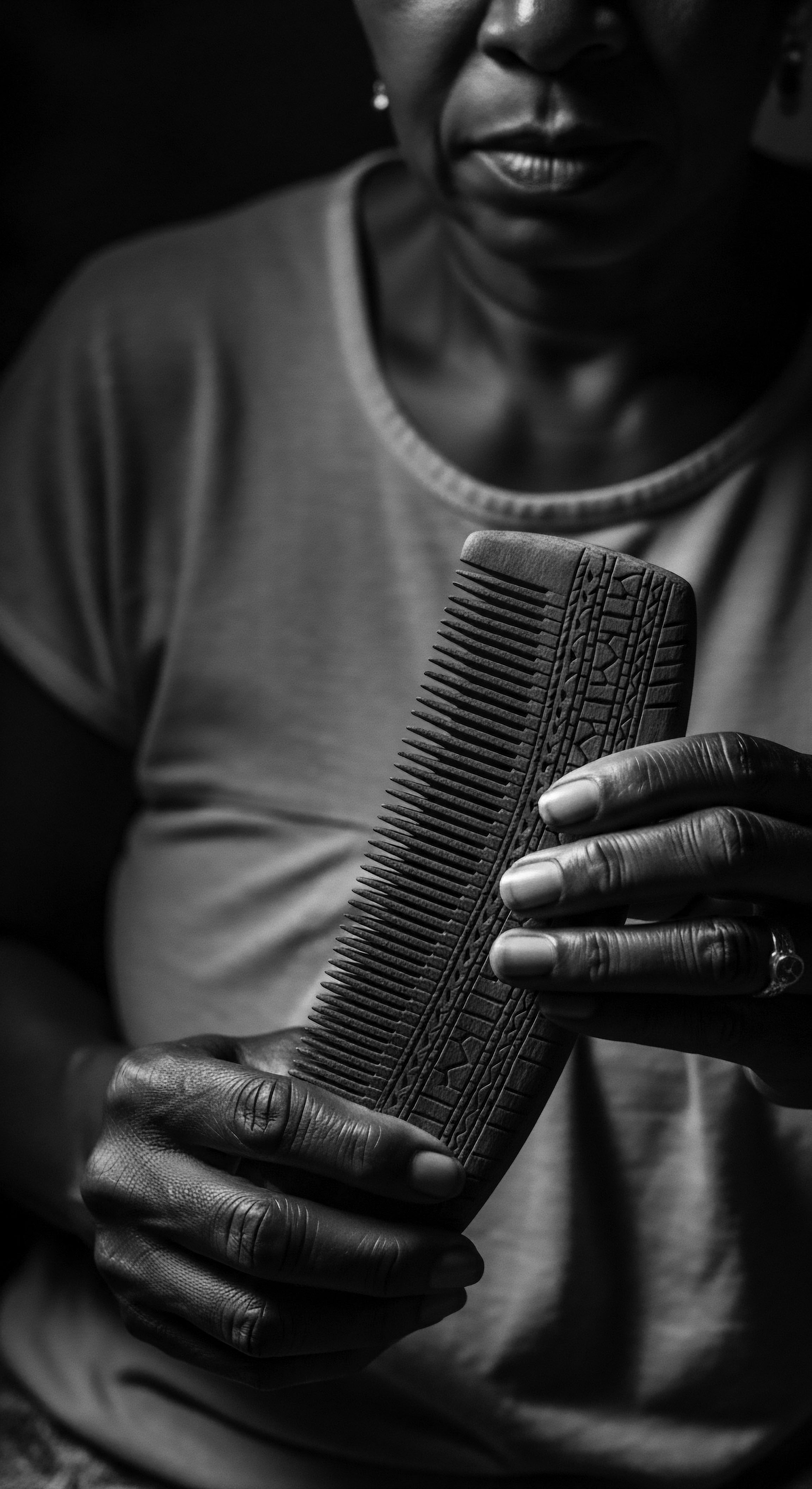
Reflection on the Heritage of Female Entrepreneurs
The journey through the definition of Female Entrepreneurs, particularly as it relates to textured hair, culminates in a profound reflection on the enduring nature of heritage. From the elemental biology that shapes each strand to the intricate historical narratives woven around Black and mixed-race hair, the thread of ancestral wisdom remains unbroken. These women, whether nameless artisans of antiquity or formal entrepreneurs of recent centuries, have consistently demonstrated a profound commitment to the hair that marks identity, chronicles experience, and celebrates lineage. Their economic ventures were seldom disconnected from the deeper cultural currents that flowed through their communities.
The very act of caring for textured hair, through its complex journey from elemental biology to modern expression, embodies a living archive of resilience and creativity. Female Entrepreneurs have been the primary custodians of this archive, transforming knowledge into tangible products and services, and by doing so, ensuring its survival and transmission. The hair traditions they upheld and commercialized were not static; they were dynamic, adapting to new environments while retaining their core reverence for heritage. This adaptability speaks to the deep intelligence embedded within ancestral practices, demonstrating a scientific understanding long before modern laboratories validated such approaches.
The influence of these women extends beyond commerce; it shapes the soul of a strand, allowing each coil and curl to tell a story of survival, artistry, and self-possession. The economic autonomy gained through these enterprises provided a foundation for broader social and political progress, proving that personal care could indeed be deeply political. The hair business, propelled by these pioneering women, became a site for identity construction, a space where beauty standards were redefined and celebrated from within the community itself.
The entrepreneurial spirit of women in textured hair care is a continuous dialogue between ancestral wisdom and contemporary ingenuity.
Looking at the landscape today, we observe the continued vibrancy of female entrepreneurship in the textured hair space, a testament to the enduring power of its heritage. New generations of women are building upon the foundations laid by their foremothers, drawing upon renewed interest in natural ingredients and traditional techniques while applying modern scientific understanding and business models. This continuous evolution reaffirms the idea that the past is not merely a bygone era; it is a living, breathing component of the present, shaping aspirations and defining pathways forward. The knowledge passed down through the ages, concerning hair care, its rituals, and its significance, remains a powerful wellspring of innovation and economic empowerment for women.
Ultimately, the story of Female Entrepreneurs in textured hair is a testament to the power of self-determination, the richness of cultural legacy, and the unwavering commitment to care that flows through generations. It is a story of economic liberation, intertwined with the profound spiritual and cultural meaning of hair, continuing to inspire, educate, and empower individuals to honor their unique heritage.
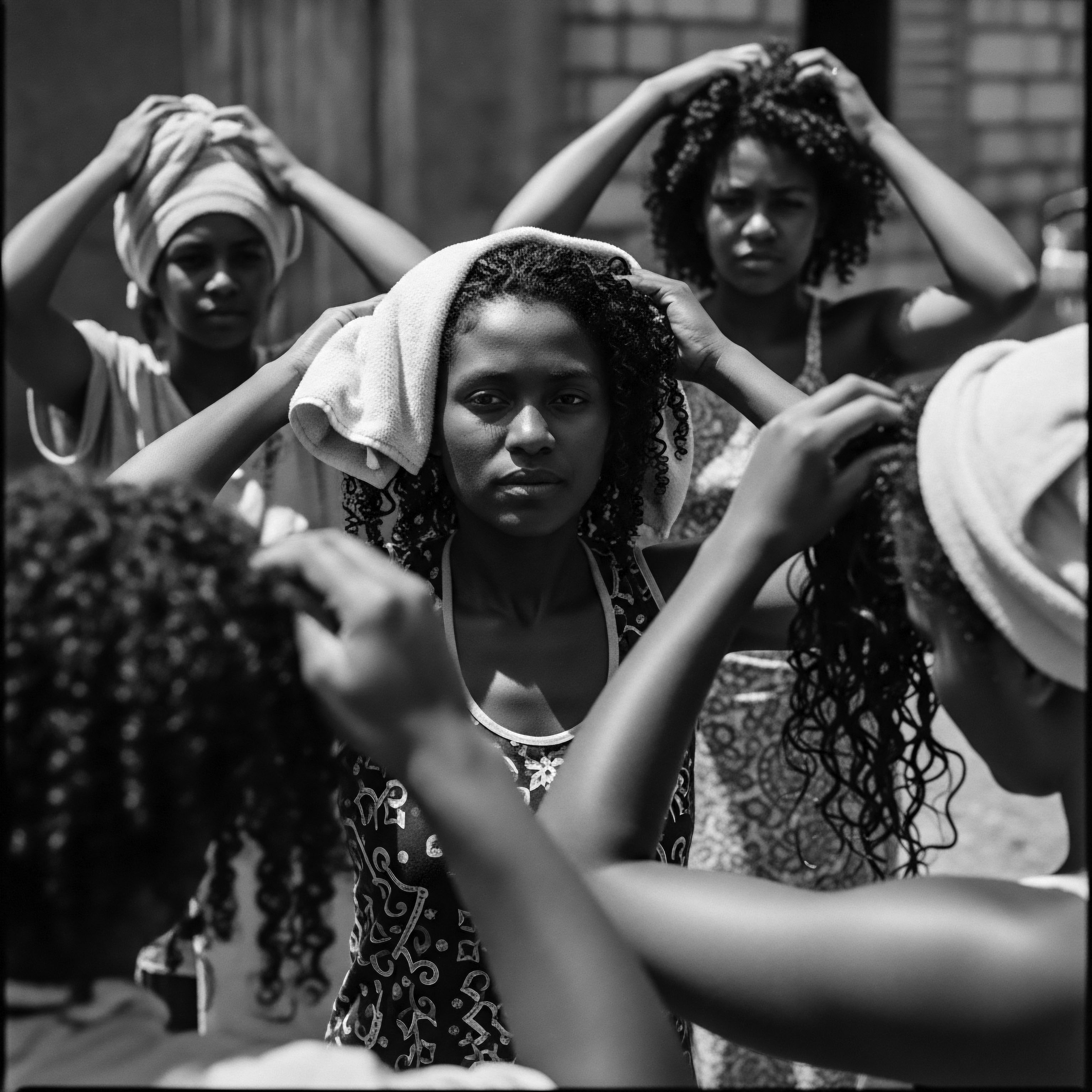
References
- Gill, Tiffany M. Beauty Shop Politics: African American Women’s Activism in the Beauty Industry. Urbana: University of Illinois Press, 2010.
- Rooks, Noliwe M. Hair Raising: Beauty, Culture, and African American Women. New Brunswick, NJ: Rutgers University Press, 1996.
- Walker, Susannah. Style and Status: Selling Beauty to African American Women, 1920-1975. Lexington, KY: University Press of Kentucky, 2007.
- Byrd, Ayana, and Lori Tharps. Hair Story: Untangling the Roots of Black Hair in America. New York: St. Martin’s Press, 2001.
- Craig, Maxine Leeds. Ain’t I a Beauty Queen: Black Women, Beauty, and the Politics of Race. New York: Oxford University Press, 2002.
- Bundles, A’Lelia. On Her Own Ground: The Life and Times of Madam C.J. Walker. New York: Scribner, 2001.

